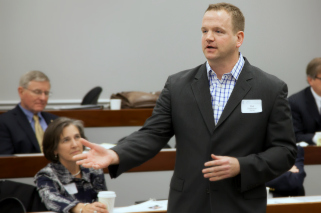News & Stories
An “all of the above” approach to the energy industry
 As students, faculty and energy industry experts convened to celebrate the launch of the UNC Kenan-Flagler Energy Concentration, discussions centered on topics that will define the industry for years to come: Fossil fuels and sustainability, and conflict resolution.
As students, faculty and energy industry experts convened to celebrate the launch of the UNC Kenan-Flagler Energy Concentration, discussions centered on topics that will define the industry for years to come: Fossil fuels and sustainability, and conflict resolution.
Drawing on experience and expertise across the industry, faculty and Energy Center advisory board members facilitated a panel discussion on the relationship between energy and sustainability and shared insights on the future of the energy business.
“The fact of the matter is that, in terms of energy solutions for a growing global population, we need an ‘all of the above’ approach to energy that moves past the politics of ‘do we focus on green or do we focus on oil and gas?’ – to figure out how we can be sustainable in terms of business, political and environmental concerns, and in terms of social development,” says Christine Shaner (MBA ’15), student development liaison for the UNC Kenan-Flagler MBA Energy Club.
This “all of the above” approach to energy refers to the mix of resources that will serve growing populations and economies, says Stephen Arbogast, director of the Energy Center. “There is no question that, on a global basis, we are going to need growing contributions from oil and gas, as well as wind, solar and nuclear resources,” he says. “What is unclear is the relative proportion of these contributions. That will be a matter of getting the prices right – including the prices of certain effects like pollution and climate impacts, which aren’t easy to price in the market place.”
 The all-of-the-above approach is what makes UNC Kenan-Flagler’s offerings unique, says Shaner. While most energy programs offered by business schools focus on either clean energy technology or the technical aspects of the oil and gas business, UNC Kenan-Flagler’s Energy Center and MBA Energy Concentration offer students a well-rounded education that prepares them for success in every facet of the energy business.
The all-of-the-above approach is what makes UNC Kenan-Flagler’s offerings unique, says Shaner. While most energy programs offered by business schools focus on either clean energy technology or the technical aspects of the oil and gas business, UNC Kenan-Flagler’s Energy Center and MBA Energy Concentration offer students a well-rounded education that prepares them for success in every facet of the energy business.
Energy Center advisory board member Sherri Steuwer says the approach addresses concerns about sustainability that she faced head-on in her former role as head of safety, health and environment at ExxonMobil.
“I truly believe that energy is necessary for economic development – it helps lift people out of poverty,” she says. “So for me, the sustainability story for energy was that we have to make it available for development, but have to do so in a way that doesn’t cause damage to the environment that compromises our quality of life in the future.”
Sustainability is a multi-faceted goal, agrees Ed Ahnert, advisory board member and former president of the ExxonMobil Education Foundation. The term, he says, can sometimes put people in an environmental rut that neglects the broader responsibility businesses have to be good corporate citizens in every aspect of their operations.
Today’s definition of sustainability is about companies finding new, responsible ways of doing business, says Carol Hee, director of the Center for Sustainable Enterprise and assistant professor of strategy and entrepreneurship.
“It’s a new set of eyes for how you see business. It’s a lens you look through that helps you see things you wouldn’t if you were only focused on short-term profits,” she says. “Sustainability can help reduce costs, mitigate risks and increase profits.”
And one of the toughest questions the energy industry is facing right now is whether a conflict exists between energy and sustainability. Steuwer notes that the energy industry has, so far, been least effective in addressing questions surrounding greenhouse gas emissions and climate change.
 “We have to think beyond sustainability” says Hee. “We need to take the power of business and leverage that talent to do things that are positive—to create business models that will not just bring sustainable profits, but that will be restorative.”
“We have to think beyond sustainability” says Hee. “We need to take the power of business and leverage that talent to do things that are positive—to create business models that will not just bring sustainable profits, but that will be restorative.”
Paul Holhouser, who teaches financing of renewable projects, is optimistic about the future of renewable technologies, but emphasizes the importance of balancing short-term economic development goals with long-term renewable energy goals.
“The viewpoint that only renewables are policy-driven is mistaken – but it’s a powerful conversation to have about long-term versus short-term tradeoffs,” he says. “It feels like a turning point; the younger generation seems to have a different sensibility on those tradeoffs. We still see quite a bit of opportunity in the longer-term, and it’s a dog fight in the short-term.”
Panelists and faculty all stressed the importance of having open dialogue on these issues, which they say will lead to more options being considered, complexity being recognized and, ultimately, finding better answers.